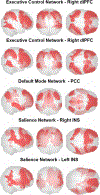Brain network functional connectivity and cognitive performance in major depressive disorder
- PMID: 30594024
- PMCID: PMC6360105
- DOI: 10.1016/j.jpsychires.2018.11.020
Brain network functional connectivity and cognitive performance in major depressive disorder
Abstract
Background: Major depressive disorder (MDD) is one of the most prevalent and debilitating psychiatric disorders. Cognitive complaints are commonly reported in MDD and cognitive impairment is a criterion item for MDD diagnosis. As cognitive processes are increasingly understood as the consequences of distributed interactions between brain regions, a network-based approach may provide novel information about the neurobiological basis of cognitive deficits in MDD.
Methods: 51 Depressed (MDD, n = 23) and non-depressed (control, n = 28) adult participants completed neuropsychological testing and resting-state fMRI (rsfMRI). Cognitive domain scores (processing speed, working memory, episodic memory, and executive function) were calculated. Anatomical regions of interests were entered as seeds for functional connectivity analyses in: default mode (DMN), salience, and executive control (ECN) networks. Partial correlations controlling for age and sex were conducted for cognitive domain scores and functional connectivity in clusters with significant differences between groups.
Results: Significant rsfMRI differences between groups were identified in multiple clusters in the DMN and ECN. Greater positive connectivity within the ECN and between ECN and DMN regions was associated with poorer episodic memory performance in the Non-Depressed group but better performance in the MDD group. Greater connectivity within the DMN was associated with better episodic and working memory performance in the Non-Depressed group but worse performance in the MDD group.
Conclusions: These results provide evidence that cognitive performance in MDD may be associated with aberrant functional connectivity in cognitive networks and suggest patterns of alternate brain function that may support cognitive processes in MDD.
Keywords: Cognition; Functional MRI; Functional connectivity; Major depression.
Copyright © 2018 Elsevier Ltd. All rights reserved.
Figures


References
Publication types
MeSH terms
Grants and funding
LinkOut - more resources
Full Text Sources
Research Materials

